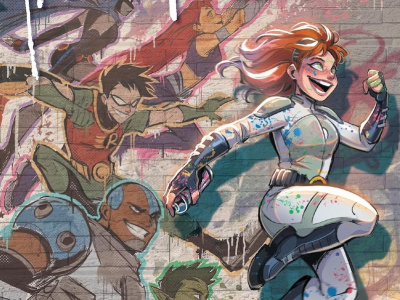Confessions of a Comic Book Guy is a weekly column by retailer Steve Bennett of Mary Alice Wilson's Dark Star Books in Yellow Springs, Ohio. This week, Bennett wraps up his series on comic formats and contents:
For those uninterested in talking about the continued health of the comic book industry (a.k.a. 'futile concerns about how comic books look'), this column will be my last word on the subject. For the moment, anyway.
I never imagined the day would come when I'd have to prove my bone fides as a comic book fan. I don't like comics, I love them, have since before I could read; be it in strip form or book, new or old, regardless of genre and whether you call them comix, manga, manhwa or bandes dessinees (we all might want to start to learn how to pronounce the French phrase for 'graphic novels' right; I've a feeling we'll be using it a lot more often before the end of the decade).
I read everything - at least I try. Growing up, there never seemed to be enough comics to feed my insatiable appetite for them so it would be more than a little ungrateful of me if I complained about the hundreds of pounds of the stuff that comes to Dark Star every Wednesday. I read them not just because it's my job (and it is), but because being able to read comics for free is the #1 perk of a Comic Book Guy.
Of course none of you could have known any of that and I suppose my last batch of columns could have been misconstrued as being 'counterproductive.' Back while working one of my many menial jobs, white and blue collar, which I held over the years I remember some middle management nitwit drilling this bit of 'inspirational' wisdom into my head:
'You don't have a problem, you have an opportunity.'
At the time it sure seemed like a convenient way of stifling workers legitimate grievances with a candy coating of American can-do-ism, but the older I get, the more wisdom I see in it. Yes, I may have gone on (and on) about what's wrong with contemporary American comics, but only because there's (of course) something we can do about it.
Our most crucial opportunity right now is getting more people to read comics; the easiest way to do that is to get comics in front of them in the natural habitat of readers -- the Barnes & Noble and Borders chains. They already carry the pamphlets, and they must be selling at least to some degree to justify their presence there. So what's needed is a more substantial sampler, one with a more attractive format which would serve as an intermediate step between the pamphlet and trade paperback collections.
As some of you have pointed out, it wouldn't be cost effective for publishers to generate original material specifically for this market. So, at least initially we're talking about repackaging reprints of material a month or two after its been released to the direct market.
The two most obvious formats for these mythical publications are the magazine (Wizard, glossy stock, 152 pages, $5.99) and the 'instant' trade (Prelude To Infinite Crisis; cheaper than normal paper stock, 92 pages for $5.99). Split the difference and create something with the advantages of (subscriptions, ads, editorial material, etc.), the contents being (like CrossGen's Forge and Edge trades) collections of five or six of a publisher's individual titles.
But not just a publisher's best-selling titles. A couple of months ago I invoked Marvels well intentioned post-9/11 failure The Call, which basically was thrown into a marketplace that absolutely zero interest in it. Stories of firemen, police and emergency care workers might have resonated with a more mainstream audience -- if they'd ever gotten a chance to see it.
By now you'd think they'd learn but Marvels still doing it, tossing out perfectly good material (the entire Marvel Next line) that has little to no chance of finding a sufficient audience in a crowded field. So let's call our first mythological magazine/trade Marvel; the leads would be New Avengers and Astounding X-Men, but the backups could include Live Wires, Spellbinders, and Mary Jane, with the final slot open for Amazing Fantasy (and like Shonen Jump in Japan, each issue would include a prepaid mail-in card where readers could rate their favorite features - instant, inexpensive market research).
What we'd get out of it would be a product that didn't directly compete with the direct market which could create a new readership of comic fans, some of whom would eventually want just the comics they want, faster. And in DM shops they'd also find a variety of comics unavailable in their Barnes and Borders.
As to how this could happen (if any of this sounds attractive), I'd start talking to Marvel and DC--at conferences and conventions, phone calls and e-mail. We in the direct sales market get so bogged down in the trenches, lurching from Wednesday to Wednesday, we don't appreciate just how much potential power we have to effect how publishers behave. We're the horse, they're the cart and it's time they started acting like it.
To end on some positive notes, after reading the piece on Infinite Crisis that ran in Wednesday's New York Times, I'm a little less nervous about the content of upcoming super-hero comics (though I wish Dan DiDio got that it's not the darkness people have like me have a problem with; I hate having to paraphrase Rambo but the real question is, 'Do the good guys get to win this time?').
Marvel made a couple of real innovations this month, first by getting a car company to place a two page ad in their comics, and second by announcing they were going to increase the value and content of some upcoming comics by placing 'Franklin Richards, Son of a Genius' strips in them at no additional cost.







